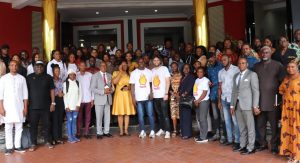
Mkpoikana Udoma
Port Harcourt — A coalition of civil society organisations, championing environmental rights and the need to address the negative consequences of climate change on communities and people in the Niger Delta region, has called for the review of the Loss and Damage policy established at the 2022 United Nations Climate Change Conference, COP 27.
Recall that aim of the Loss and Damage policy is to provide financial assistance to poorer nations as they deal with the negative consequences arising from the unavoidable risks of climate change, such as rising sea levels, extreme heat waves, desertification, forest fires and crop failures, among others.
But the coalition explained that the Loss and Damage policy focused only on the measurable damages and failed to capture the immeasurable damages.
Speaking at the three-day Niger Delta Climate Change Conference in Port Harcourt, Executive Director of We The People, Mr Ken Henshaw, while acknowledging the good intention of the policy to proffer solutions to the impact of climate change, noted that it only focused on infrastructural damages thereby neglecting all other damages.
“We need to start looking into why the loss and damage policy is only focused on the infrastructural damages. Yes, if we look at infrastructural damage we will get to know which person home was destroyed, which mosque, church was destroyed.
“But what about the immeasurable damages which are the washing away of our farm lands by flooding? Our fathers graves that have been submerged and damage by flood? how about the lands lost into the seas? Our children that their education have been truncated due to flood rising and risng sea levels, how do we measure this damages? So this is our argument,” he said.
Earlier, the facilitator of the Conference and Executive Director of Lekeh Development Foundation, Mr. Nbani Friday Barilule, said there was need to bring the issues of climate change and its impact on the people of Niger Delta to the front burner.
Barilule said the Conference was imperative in order to enhance the vocality of the Niger Delta region in finding solutions to the losses and damages caused by climate change, as well as to call on the government for action.
He stated: “The purpose of this conference is to develop a regional vocality for Niger Delta climate change adaptation and mitigation measures in order to mitigate the loss and damages that happens as a result of climate change.
“It is fundamental that we should call for actions intentionally, because sometimes you do not wait for your father to tell you what to do, the Federal Government, state government and the local government I believe they know what to do but you know there might be a delay of one protocol, one policy, you all know the kind of system we run in Nigeria even for some of them to make a statement they start waiting for permission from the top basically the government are very slow in taking actions.
“So we are trying to see how a local action can be developed so we can have an idea about climate change and quickly amplified it so tomorrow we can come out boldly and show other entities, private sectors including the federal government that this is what we observed, this iswhat we have done so far and this is what we are recommending.”
Also speaking, Executive Director of Kebetkache, Chief Emem Okon, who focused on the impact of climate change on the Niger Delta women, regretted that women were the most affected due to the gender roles they performed within the family and and also the peculiarity of their reproductive roles.
“The impacts are many and when we talk about climate change in the Niger Delta, we are first and foremost looking at what we are experiencing with the oil and gas exploration and because part of the consequences of oil and gas extraction is gas flaring, gas flaring contributes to global warming and global warming is part of the cause of climate change and we are experiencing alot of climate change manifestation.
“So if I take off flooding which has been a major incident in the Niger Delta, we experience flood on a daily basis and it has caused displacement, it has affected farmers particularly the women and gas flare on its own has caused alot of challenges.
“We also experience alot of acid rain and when we talk about acid rain traditionally growing up due to lack of access to clean water women use to harvest rain water for cooking, washing and bathing but unfortunately that is not possible anymore in the present day in the Niger Delta
“And then we look at food security, availability of healthy food impact of pollution impacts of climate change has affected crops yield, harvest is very poor,” he said.
Follow us on twitter



